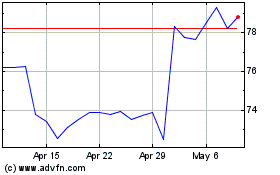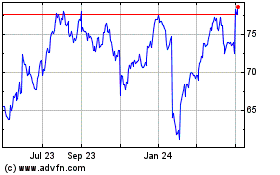
|
2150 Kittredge St. Suite 450
|
www.asyousow.org
|
|
Berkeley, CA 94704
|
BUILDING A SAFE, JUST, AND SUSTAINABLE WORLD SINCE 1992
|
Notice of Exempt Solicitation Pursuant to Rule 14a-103
Name of the Registrant: DuPont de Nemours Inc (DD)
Name of persons relying on exemption: As You Sow
Address of persons relying on exemption: 2150 Kittredge St. Suite 450, Berkeley, CA 94704
Written materials are submitted pursuant to Rule 14a-6(g)(1) promulgated
under the Securities Exchange Act of 1934. Submission is not required of this filer under the terms of the Rule, but is made voluntarily
in the interest of public disclosure and consideration of these important issues.
DuPont de Nemours Inc (DD)
Vote Yes: Proposal 7 – Annual Report on Plastic Pollution
Annual Meeting:
April 28, 2021
CONTACT: Kelly McBee | kmcbee@asyousow.org
THE RESOLUTION
Resolved: Shareholders request that the Board of Directors of
DuPont issue an annual report to shareholders, beginning in 2021, at reasonable cost and omitting proprietary information, on plastic
pollution. The report should disclose trends in the amount of plastic in various forms released to the environment by the company annually,
and concisely assess the effectiveness of the company’s policies and actions to reduce the volume of the company’s plastic
materials contaminating the environment.
Supporting statement: Proponent recommends that the report include
discussion of loss prevention, cleanup and containment for all relevant categories of plastic materials released, regardless of whether
they are pellets, powder, flake, granules, or other particles.
SUMMARY
Plastic pollution is a global environmental crisis, and DuPont de Nemours
is a leading producer of transportation and industrial plastics. Most plastic products originate from preproduction plastic pellets, or
nurdles. Due to spills and poor handling procedures, pellets are routinely swept into waterways during production and transportation,
and are increasingly found on beaches and shorelines.
An estimated eleven million metric tons of plastics—including
pellets—leak into oceans annually and this figure is expected to grow to 24 million metric tons by 2040.1 Ocean plastic
pollution causes fatalities in more than 800 marine species from ingestion, entanglement, suffocation, or drowning.2 Pellets
are similar in size and shape to fish eggs and are often mistaken by marine animals for food. Plastic pellets can absorb toxins such as
dioxins from water and transfer them to the marine food web and potentially to humans through consumption of seafood.
_____________________________
1 https://www.pewtrusts.org/-/media/assets/2020/07/breakingtheplasticwave_report.pdf
2 https://news.un.org/en/story/2016/12/547032-new-un-report-finds-marine-debris-harming-more-800-species-costing-countries

|
2021
Proxy Memo
DuPont
de Nemours Inc | Plastic Pollution Reporting Proposal
|
Plastic pellets are estimated to be the second largest direct source
of microplastic pollution to the ocean by weight, with more than ten trillion spilled every year.3 More than 200 pellet, flake,
and powder spills have been reported to the National Response Center since reporting began. Plastic does at least $13 billion in damage
to marine ecosystems annually.4 If no action is taken, oceans are expected to contain more plastic than fish (by weight) by
2050.5
Pellet spills create financial risk. Petrochemical and plastics companies
have recently paid substantial fines for pellet releases, with the largest fine reaching $50 million.6
DuPont is a member of Operation Clean Sweep, an industry program that
encourages best practices to reduce pellet loss, but which provides no public reporting on spill incidents.
Given the severe biodiversity and economic impacts of plastic pollution
described above, there is an urgent need to increase reporting on pellet spills and remediation. In the least two years, corporate peers,
Chevron Phillips Chemical, ExxonMobil Chemical, Dow Chemical, and three others have agreed to public reporting of pellet spills. Such
reporting is a necessary first step to the company realizing its 2030 goal to “Integrate circular economy principles into our business
models considering lifecycle impacts in the markets we serve.”7
RATIONALE FOR A YES
VOTE
|
|
1)
|
DuPont de Nemours compares poorly to peers in disclosing pellet handling and spill information. DuPont is one of the only large
publicly traded plastics manufacturers in the United States that does not publicly disclose information about its pellet spills and handling
practices. Six other companies already have committed to disclose this information.
|
|
|
2)
|
Plastic pollution is a growing and unmitigated financial risk for DuPont de Nemours. Two recent US lawsuits against plastic
producers and transporters for releasing pellets into the environment have cost the plastics industry tens of millions of dollars. Federal
legislation is pending and Europe is moving forward with a pellet supply chain certification scheme. DuPont must demonstrate that it is
handling its plastic pellets responsibly and is prepared to respond quickly and efficiently if new federal
and/or state regulations pass.
|
_____________________________
3 https://rethinkplasticalliance.eu/wp-content/uploads/2020/02/spotlight_on_plastic_pellets_ecos_rpa.pdf
4 http://wedocs.unep.org/handle/20.500.11822/9238
5 https://www.ellenmacarthurfoundation.org/assets/downloads/EllenMacArthurFoundation_TheNewPlasticsEconomy_Pages.pdf
6 https://www.texastribune.org/2019/10/15/formosa-plastics-pay-50-million-texas-clean-water-act-lawsuit/
7 https://www.dupont.com/content/dam/dupont/amer/us/en/corporate/about-us/Sustainability/Dupont%202020%20GRI%20Index_FinalF.pdf

|
2021
Proxy Memo
DuPont
de Nemours Inc | Plastic Pollution Reporting Proposal
|
|
|
3)
|
DuPont de Nemours does not provide shareholders with sufficient analysis and disclosure of how it effectively prevents and mitigates
this growing risk. With increased transparency of DuPont’s pellet handling practices and spill data shareholders would be assured
that they are investing in a corporation that manages its product responsibly and is mitigating risk.
|
DISCUSSION
|
|
1.
|
DuPont de Nemours compares poorly to peers in disclosing pellet handling and spill information. DuPont is one of the few large
publicly traded plastic producers in the United States not committed to disclosing information on pellet handling practices and pellet
spill data. Six other companies rapidly responded to investor and public concern for the issue with each agreeing to take new transparency
actions in the last two years. After shareholders demonstrated the benefits of increased reporting through dialogue, only one corporation
saw a shareholder vote before agreeing to take action.
Chevron Phillips Chemical, Exxon Mobil Chemical, Dow Chemical, Eastman Chemical, Westlake Chemical, and Occidental Petroleum have all
agreed to make public its pellet handling practices and disclose the number of pellets that are released into the environment. Of these
companies
Chevron Phillips Chemical leads in pellet handling disclosure. CP Chem provides details on its internal pellet governance (including examples
of internal audit sheets), states its commitment to minimizing pellet loss, and makes public its data on how many pellets are spilled,
recovered, recycled, and unrecovered.8
|
|
|
2.
|
Plastic pollution is a growing and unmitigated financial risk for DuPont de Nemours. Pellet releases into the environment routinely
happen through large accidental events and through chronic leakage throughout the plastics supply chain. Most recently, an August 2020
storm caused the release of 880 fifty-five-pound bags of Dow Chemical branded pellets. Most of the bags ripped open upon release, dumping
approximately 1 billion plastic pellets into the Mississippi River. The spill was left untended to by Dow and its hired transporter for
three full weeks, leaving citizens to voluntarily organize clean-up and generating significant public outrage and media attention.9
There is significant public pressure to increase regulations around pellet release; 280 environmental, indigenous, and other non-governmental
groups have formally petitioned the US Environmental Protection Agency to more expressly prohibit the discharge of plastic pellets and
other plastic materials in industrial stormwater and wastewater.10
In the absence of sufficient corporate action some governments are in the process of expanding plastic pollution regulations. In the United
States, Senator Tom Udall of New Mexico has introduced The Plastic Pellet Free Waters Act to expand prohibitions on the release of pellets
into water or onto land.11
|
_____________________________
8 https://www.cpchem.com/sustainability/planet/pellet-management
9 https://www.desmogblog.com/2020/08/28/new-orleans-louisiana-plastic-spill-mississippi-river-nurdle-apocalypse/
10 https://qhi7a3oj76cn9awl3qcqrh3o-wpengine.netdna-ssl.com/wp-content/uploads/2020/08/EPA-petition1.pdf
11 https://www.congress.gov/bill/116th-congress/senate-bill/4681/text

|
2021
Proxy Memo
DuPont
de Nemours Inc | Plastic Pollution Reporting Proposal
|
Stakeholders throughout the pellet supply chain in Europe are in the process of developing a supply chain certification scheme for compliance
by all plastic pellet handlers.12 With an anticipated publication date of July 2021, the standard is expected to be adopted
as a formal recommendation of the OSPAR Commission and then accordingly adopted and complied with by all signatory countries and the European
Commission. As part of its Single-Use Plastics Directive13 the European Commission has stated that it will consider making
a certification scheme for pellets, such as this one, a mandatory obligation throughout the supply chain.14 Such standard may
set the stage for similar action in the U.S.
|
|
3.
|
DuPont de Nemours does not provide shareholders with sufficient analysis and disclosure of how it effectively prevents and mitigates
this growing risk. At present, the company provides no information on what, if any, procedures it has in place to prevent pellet spills,
whether or how the company evaluates the effectiveness of these procedures, nor how many pellets are lost to the environment through company
operations versus those that are produced, recovered, or recycled.
This dearth of information reflects negatively on the company’s commitment to product stewardship and increases potential brand
risk for the company.
|
RESPONSE TO DUPONT
DE NEMOURS BOARD OF DIRECTORS’ STATEMENT IN
OPPOSITION
DuPont de Nemour’s Opposition Statement argues that its current
practices for mitigating plastic pollution are sufficient, though the company cites only its participation in Operation Clean Sweep. Yet,
in the thirty years Operation Clean Sweep has existed, it has never published data about the effectiveness of its program nor any quantitative
reports on the size and scope of pellet spills. In fact, the former vice president of the trade group that founded Operation Clean Sweep
has shared that the program was largely designed to fend off regulation, not to ensure compliance or success.15
CONCLUSION
Vote “Yes” on this Shareholder Proposal seeking information
on how DuPont handles pellets and its spill data.
Plastic pollution is of increasing concern to investors. The solutions
to plastic pellet pollution are widely agreed upon and producers like DuPont have substantial control over, and ability to, execute them
to prevent pollution. DuPont de Nemours must ensure that shareholders have sufficient information – through disclosure of its pellet
handling practices and spill data – to feel confident that the company is mitigating its exposure
to public and financial risk.
_____________________________
12 https://cms.fauna-flora.org/wp-content/uploads/2020/06/2020_BSI-pellets-standard-press-release.pdf
13 https://resource.co/article/european-parliament-votes-ban-single-use-plastics-13153
14 https://ec.europa.eu/commission/presscorner/detail/en/MEMO_18_3909
15 https://www.npr.org/2020/12/22/946716058/big-oil-evaded-regulation-and-plastic-pellets-kept-spilling

|
2021
Proxy Memo
DuPont
de Nemours Inc | Plastic Pollution Reporting Proposal
|
Shareholders request support for this proposal, which will bring increased
transparency from DuPont about its intentions to prevent plastic pollution and advance the company closer to its 2030 goal to: “Integrate
circular economy principles into our business models considering lifecycle impacts in the markets we serve.”
--
For questions, please contact Kelly McBee, As You Sow; kmcbee@asyousow.org
THE FOREGOING INFORMATION MAY BE DISSEMINATED TO SHAREHOLDERS VIA TELEPHONE,
U.S. MAIL, E-MAIL, CERTAIN WEBSITES AND CERTAIN SOCIAL MEDIA VENUES, AND SHOULD NOT BE CONSTRUED AS INVESTMENT ADVICE OR AS A SOLICITATION
OF AUTHORITY TO VOTE YOUR PROXY. THE COST OF DISSEMINATING THE FOREGOING INFORMATION TO SHAREHOLDERS IS BEING BORNE ENTIRELY BY ONE OR
MORE OF THE CO-FILERS. PROXY CARDS WILL NOT BE ACCEPTED BY ANY CO-FILER. PLEASE DO NOT SEND YOUR PROXY TO ANY CO-FILER. TO VOTE YOUR PROXY,
PLEASE FOLLOW THE INSTRUCTIONS ON YOUR PROXY CARD.
5
DuPont de Nemours (NYSE:DD)
Historical Stock Chart
From Mar 2024 to Apr 2024

DuPont de Nemours (NYSE:DD)
Historical Stock Chart
From Apr 2023 to Apr 2024
